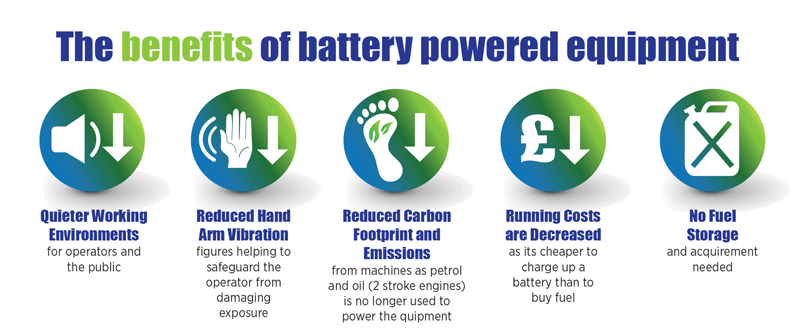Battery Technology is THE Future

 The last couple of years in particular has seen the rise in battery powered products for uses within the groundcare industry other than just handheld machinery such as hedge cutters for example.
The last couple of years in particular has seen the rise in battery powered products for uses within the groundcare industry other than just handheld machinery such as hedge cutters for example.
The benefits of battery powered equipment include:
- Quieter working environments for operators and the public
- Reduced Hand Arm Vibration figures helping to safe-guard the operator to damaging exposure
- Reducing the carbon footprint and emissions from machines as petrol and oil (two stroke engines) is no longer used to power the equipment
- Running costs are decreased as its cheaper to charge up a battery than to buy fuel
- Fuel storage and acquirement are no longer issues
As the batteries have improved in terms of run time, power and speed to fully charge, the scope for further advancement into the Groundcare machinery sector was inevitable. The hardest concept to get across to the operator is that you are buying for fuel upfront in terms of battery. To charge up a generic power pack you are looking between 5-10p depending upon its capacity. The operator does not have to worry about wasting time buying and storing fuel. Fuel can also be spilt, stolen or mixed wrong affecting the bottom line of the contract. Fuel can also go off if left for two long between uses which normally happens between the end of the cutting season and the start of the next. This causes further downtime.
Battery Powered Ranges
Other machinery, such as commercial mowers have now entered the market and have had a very positive reception and impact. This has been for contractors, councils as well as private individuals who are not only more environmentally aware but also want to protect the well-being of their staff. Additionally, more and more consideration is being given on improving the impact groundcare machinery can have on the public, for example noise for shift workers.
Other machinery now includes chemical free weed-rippers, sweepers, gritters, snow blades. These machines can be dedicated machines such as the multi use such as the Koppl Compact Easy E-Drive. The Koppl can admirably complete a number of tasks with the same power unit. Simply just change the head and you change from weed-ripping to gritting or sweeping in less than a minute without the use of tools.
Considerations
Firstly, the operator has to calculate how much power duration they require between charges. From this they can make decisions on the size of batteries required. There are batteries that weigh up to 7.5kg and can last between 4-5 hours mowing. The larger batteries may last for 4 hours but if you need 5-6 hours worth of work it might be better to buy smaller ones and simply charge and rotate. There is simply not one size fits all when it comes to battery powered groundcare machines.
Build quality and features also play a significant role in the consideration process before purchasing. For example, it would be no good to buy a domestic machine for a contractor just because the run time is longer. The machine should be commercially built to withstand the environment for which it will be used.
Batteries can also fit and work with other machines within the brand range. For example, the smaller batteries may fit directly into a hedge cutter or blower. The larger batteries must be carried on the operators back for handheld equipment as if they were incorporated into the machine they would be too heavy to use for any extended amount of time.
Less obvious advantages include that you can use the machines inside as there are no concerns about exhaust emissions. So, sweeping covered pathways in airports and indoor 3G training pitches are two other areas where these machines can significantly increase operator productivity, area presentation and safety.
It can be anticipated that the sector will within the next 3-5 years see a rapid and significant shift over to battery powered equipment. Less than 3 years for 75% of all machinery under 9hp could be battery powered and in 5 years this would reach 50% of new machinery sold under 25hp including ride on mowers. These figures may look fanciful, but it has already begun and if the Groundcare industry can play its part in carbon reduction, operator safety and public well-being then we can all be in an industry we can be proud to be involved in.
Read more on the PSD Blog:
Weed removal without chemicals
Turf Revival
Talk to your local dealer |
| Have you found this article useful?
If you would like to keep up to date with our growing resource of groundcare related information please subscribe to our Bi-Monthly Newsletter |


